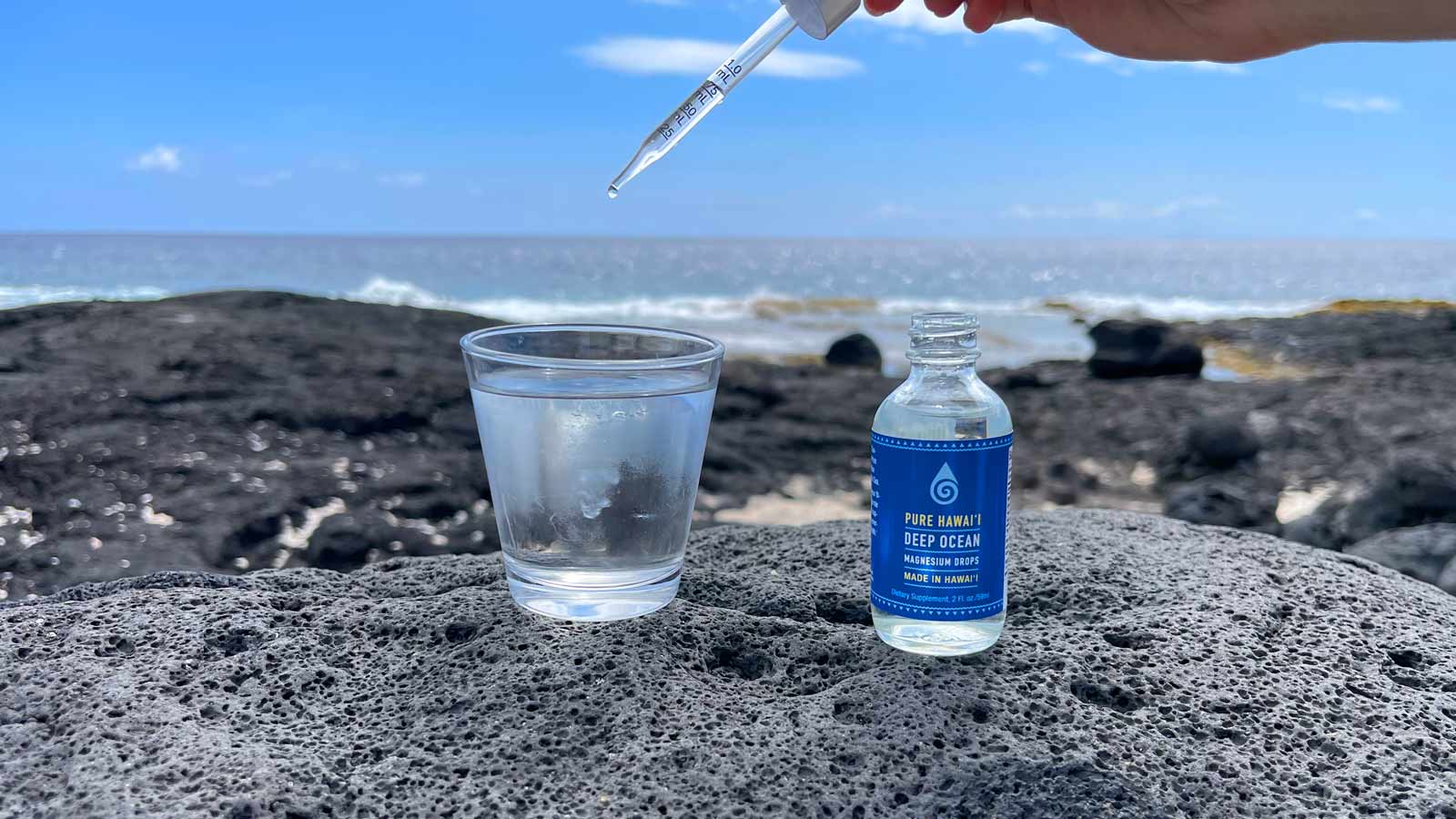Drawn from mineral rich and ultra-pristine deep ocean waters 2200 feet below the surface of Hawaii’s ocean, our Deep Ocean Magnesium Mineral Drops are the perfect way to mineral-enhance your drinking water while enjoying the many health benefits of Magnesium.
Magnesium is one of six macro or major minerals needed by the body and plays an essential role in hundreds of biological processes.
- Supports Muscle Function
- Promotes Relaxation and Sound Sleep
- Fights Stress
- Promotes Normal Blood Pressure and Steady Heart Rhythm
- Helps Regulate Blood Sugar Levels
- Supports Bone Health and Prevention of Osteoporosis
- Helps Maintain a Healthy Immune System, Healthy Metabolism and Energy Level
Magnesium must be continually supplied to the body as the body needs it on an ongoing basis. If we do not take in an adequate amount of Magnesium, our body will remove it from our bones or will suffer from deficiency. Classic Symptoms of Magnesium Deficiency are: Muscle Cramps, Irregular Heart Rhythm but also Insomnia, Irritability and Migraine Headaches.
The Recommended Daily Intake is 420 mg for adult men and 320 for adult women. It is estimated that 75 of US adults do not get enough Magnesium through their diets. Our bodies do not absorb all the Magnesium taken in, according to studies only about 20-50% of Magnesium is actually absorbed by the body. The following decrease absorption rates: consumption of carbonated beverages, sugars, coffee and caffeinated beverages and alcohol, stress and age. Phosphates in dark colored carbonated beverages will actually bind Magnesium and render it unusable by the body.
Three reasons US adults do not get enough Magnesium through their diets: Processing Foods:
- Refining Oils, Grains and Sugars removes all or almost all Magnesium. Some nutrients will be put back by “Enriching” but Magnesium is not one of them.
- Reduced Levels due to Modern Farming: Fertilization will make plants grow and bulk fast but also reduce the amount of magnesium absorbed by the plant. The plant will suffer in nutritional quality and contain less minerals and vitamins. The Journal of American College of Nutrition released a study to compare current nutrient content of crops to 1950 levels and found declines were as high as 40%.*
- Our Eating Habits: The typical modern American diet is rich in processed foods, fats, carbonated beverages and sugar and will not only not provide enough but actually increase the need for Magnesium in the body. Additionally, Water Softening is often done by households to improve the cleaning properties of water but also removes a valuable source of Magnesium and other minerals.
Our Deep Ocean Magnesium Mineral Drops are a great way to make your own Magnesium Mineral Water, it will add Magnesium to your diet not only in a tasty way but also in a way that also makes it easy for the body to absorb it. Magnesium that dissolves in water like our Magnesium Chloride is more completely absorbed then less soluble forms. We recommend one drop of Deep Ocean Magnesium Mineral per one ounce of water – 8 drops for an 8oz cup of water or 24 drops for a large water flask or 24oz carafe.
References
- Institute of Medicine (IOM). Food and Nutrition Board. Dietary Reference Intakes: Calcium, Phosphorus, Magnesium, Vitamin D and Fluoride. Washington, DC: National Academy Press, 1997.
- Rude RK. Magnesium. In: Coates PM, Betz JM, Blackman MR, Cragg GM, Levine M, Moss J, White JD, eds. Encyclopedia of Dietary Supplements. 2nd ed. New York, NY: Informa Healthcare; 2010:527-37.
- Rude RK. Magnesium. In: Ross AC, Caballero B, Cousins RJ, Tucker KL, Ziegler TR, eds. Modern Nutrition in Health and Disease. 11th ed. Baltimore, Mass: Lippincott Williams & Wilkins; 2012:159-75.
- Volpe SL. Magnesium. In: Erdman JW, Macdonald IA, Zeisel SH, eds. Present Knowledge in Nutrition. 10th ed. Ames, Iowa; John Wiley & Sons, 2012:459-74.
- Elin RJ. Assessment of magnesium status for diagnosis and therapy. Magnes Res 2010;23:1-5. [PubMed abstract]
- Gibson, RS. Principles of Nutritional Assessment, 2nd ed. New York, NY: Oxford University Press, 2005.
- Witkowski M, Hubert J, Mazur A. Methods of assessment of magnesium status in humans: a systematic review. Magnesium Res 2011;24:163-80. [PubMed abstract]
- Azoulay A, Garzon P, Eisenberg MJ. Comparison of the mineral content of tap water and bottled waters. J Gen Intern Med 2001;16:168-75. [PubMed abstract]
- Fine KD, Santa Ana CA, Porter JL, Fordtran JS. Intestinal absorption of magnesium from food and supplements. J Clin Invest 1991;88:396-402. [PubMed abstract]
- U.S. Department of Agriculture, Agricultural Research Service. FoodData Central, 2019.
- U.S. Food and Drug Administration. Food Labeling: Revision of the Nutrition and Supplement Facts Labels. 2016.
- Ranade VV, Somberg JC. Bioavailability and pharmacokinetics of magnesium after administration of magnesium salts to humans. Am J Ther 2001;8:345-57. [PubMed abstract]
- Firoz M, Graber M. Bioavailability of US commercial magnesium preparations. Magnes Res 2001;14:257-62. [PubMed abstract]
- Mühlbauer B, Schwenk M, Coram WM, Antonin KH, Etienne P, Bieck PR, Douglas FL. Magnesium-L-aspartate-HCl and magnesium-oxide: bioavailability in healthy volunteers. Eur J Clin Pharmacol 1991;40:437-8. [PubMed abstract]
- Lindberg JS, Zobitz MM, Poindexter JR, Pak CY. Magnesium bioavailability from magnesium citrate and magnesium oxide. J Am Coll Nutr 1990;9:48-55. [PubMed abstract]
- Walker AF, Marakis G, Christie S, Byng M. Mg citrate found more bioavailable than other Mg preparations in a randomized, double-blind study. Mag Res 2003;16:183-91. [PubMed abstract]
- Spencer H, Norris C, Williams D. Inhibitory effects of zinc on magnesium balance and magnesium absorption in man. J Am Coll Nutr 1994;13:479-84. [PubMed abstract]
- Guerrera MP, Volpe SL, Mao JJ. Therapeutic uses of magnesium. Am Fam Physician 2009;80:157-62. [PubMed abstract]
- Phillips’®. Phillips’ Milk of Magnesia. 2012.
- Rolaids®. 2012.
- Tums®. 2012.
- U.S. Department of Agriculture, Agricultural Research Service. Usual Nutrient Intake from Food and Beverages, by Gender and Age, What We Eat in America, NHANES 2013-2016; 2019.
- Bailey RL, Fulgoni III VL, Keast DR, Dwyer JD. Dietary supplement use is associated with high intakes of minerals from food sources. Am J Clin Nutr 2011;94:1376-81. [PubMed abstract]
- Rosanoff A, Weaver CM, Rude RK. Suboptimal magnesium status in the United States: are the health consequences underestimated? Nutr Rev 2012;70:153-64. [PubMed abstract]
- Chaudhary DP, Sharma R, Bansal DD. Implications of magnesium deficiency in type 2 diabetes: a review. Biol Trace Elem Res 2010;134:119–29. [PubMed abstract]
- Tosiello L. Hypomagnesemia and diabetes mellitus. A review of clinical implications. Arch Intern Med 1996;156:1143-8. [PubMed abstract]
- Rivlin RS. Magnesium deficiency and alcohol intake: mechanisms, clinical significance and possible relation to cancer development (a review). J Am Coll Nutr 1994;13:416–23. [PubMed abstract]
- Ford ES, Mokdad AH. Dietary magnesium intake in a national sample of U.S. adults. J Nutr 2003;133:2879-82. [PubMed abstract]
- Musso CG Magnesium metabolism in health and disease. Int Urol Nephrol 2009;41:357-62. [PubMed abstract]
- Barbagallo M, Belvedere M, Dominguez LJ. Magnesium homeostasis and aging. Magnes Res 2009;22:235-46. [PubMed abstract]
- Dickinson HO, Nicolson D, Campbell F, Cook JV, Beyer FR, Ford GA, Mason J. Magnesium supplementation for the management of primary hypertension in adults. Cochrane Database of Systematic Reviews 2006: CD004640. [PubMed abstract]
- Kass L, Weekes J, Carpenter L. Effect of magnesium supplementation on blood pressure: a meta-analysis. Eur J Clin Nutr 2012;66:411-8. [PubMed abstract]
- Champagne CM. Dietary interventions on blood pressure: the Dietary Approaches to Stop Hypertension (DASH) trials. Nutr Rev 2006;64:S53-6. [PubMed abstract]
- Peacock JM, Ohira T, Post W, Sotoodehnia N, Rosamond W, Folsom AR. Serum magnesium and risk of sudden cardiac death in the Atherosclerosis Risk in Communities (ARIC) study. Am Heart J 2010;160:464-70. [PubMed abstract]
- Chiuve SE, Korngold EC, Januzzi Jr JL, Gantzer ML, Albert CM. Plasma and dietary magnesium and risk of sudden cardiac death in women. Am J Clin Nutr 2011;93:253-60. [PubMed abstract]
- Joosten MM, Gansevoort RT, Mukamal KJ, van der Harst P, Geleijnse JM, Feskens EJM, Navis G, Bakker SJL. Urinary and plasma magnesium and risk of ischemic heart disease. Am J Clin Nutr 2013;97:1299-306. [PubMed abstract]
- Del Gobbo LC, Imamura F, Wu JHY, Otto MCdO, Chiuve SE, Mozaffarian D. Circulating and dietary magnesium and risk of cardiovascular disease: a systematic review and meta-analysis of prospective studies. Am J Clin Nutr 2013;98:160-73. [PubMed abstract]
- Larsson SC, Orsini N, Wolk A. Dietary magnesium intake and risk of stroke: a meta-analysis of prospective studies. Am J Clin Nutr 2012;95:362-6. [PubMed abstract]
- Song Y, Liu S. Magnesium for cardiovascular health: time for intervention. Am J Clin Nutr 2012;95:269-70. [PubMed abstract]
- Larsson SC, Wolk A. Magnesium intake and risk of type 2 diabetes: a meta-analysis. J Intern Med 2007;262:208-14. [PubMed abstract]
- Rodriguez-Moran M, Simental Mendia LE, Zambrano Galvan G, Guerrero-Romero F. The role of magnesium in type 2 diabetes: a brief based-clinical review. Magnes Res 2011;24:156-62. [PubMed abstract]
- Simmons D, Joshi S, Shaw J. Hypomagnesaemia is associated with diabetes: not pre-diabetes, obesity or the metabolic syndrome. Diabetes Res Clin Pract 2010;87:261-6. [PubMed abstract]
- Schulze MB, Schulz M, Heidemann C, Schienkiewitz A, Hoffmann K, Boeing H. Fiber and magnesium intake and incidence of type 2 diabetes: a prospective study and meta-analysis. Arch Intern Med 2007;167:956–65. [PubMed abstract]
- Dong J-Y, Xun P, He K, Qin L-Q. Magnesium intake and risk of type 2 diabetes: meta-analysis of prospective cohort studies. Diabetes Care 2011;34:2116-22. [PubMed abstract]
- Evert AB, Boucher JL, Cypress M, Dunbar SA, Franz MJ, Mayer-Davis EJ, Neumiller JJ, Nwankwo R, Verdi CL, Urbanski P, Yancy WS Jr. Nutrition therapy recommendations for the management of adults with diabetes. Diabetes Care 2013;36:3821-42. [PubMed abstract]
- Lima MDL, Cruz T, Pousada JC, Rodrigues LE, Barbosa K, Canguco V. The effect of magnesium supplementation in increasing doses on the control of type 2 diabetes. Diabetes Care 1998;21:682-6. [PubMed abstract]
- Rodriquez-Moran M, Guerrero-Romero F. Oral magnesium supplementation improves insulin sensitivity and metabolic control in type 2 diabetic subjects: a randomized double-blind controlled trial. Diabetes Care 2003;26:1147-52. [PubMed abstract]
- de Valk HW, Verkaaik R, van Rijn HJ, Geerdink RA, Struyvenberg A. Oral magnesium supplementation in insulin-requiring Type 2 diabetic patients. Diabet Med 1998;15:503-7 [PubMed abstract]
- Rude RK, Singer FR, Gruber HE. Skeletal and hormonal effects of magnesium deficiency. J Am Coll Nutr 2009;28:131–41. [PubMed abstract]
- Tucker KL. Osteoporosis prevention and nutrition. Curr Osteoporos Rep 2009;7:111-7. [PubMed abstract]
- Mutlu M, Argun M, Kilic E, Saraymen R, Yazar S. Magnesium, zinc and copper status in osteoporotic, osteopenic and normal post-menopausal women. J Int Med Res 2007;35:692-5. [PubMed abstract]
- Aydin H, Deyneli O, Yavuz D, Gözü H, Mutlu N, Kaygusuz I, Akalin S. Short-term oral magnesium supplementation suppresses bone turnover in postmenopausal osteoporotic women. Biol Trace Elem Res 2010;133:136-43. [PubMed abstract]
- Sun-Edelstein C, Mauskop A. Role of magnesium in the pathogenesis and treatment of migraine. Expert Rev Neurother 2009;9:369–79 [PubMed abstract]
- Schürks M, Diener H-C, Goadsby P. Update on the prophylaxis of migraine. Cur Treat Options Neurol 2008;10:20–9. [PubMed abstract]
- Holland S, Silberstein SD, Freitag F, Dodick DW, Argoff C, Ashman E. Evidence-based guideline update: NSAIDs and other complementary treatments for episodic migraine prevention in adults. Neurology 2012;78:1346-53. [PubMed abstract]
- Natural Medicines Comprehensive Database. Magnesium. 2013.
- Kutsal E, Aydemir C, Eldes N, Demirel F, Polat R, Taspnar O, Kulah E. Severe hypermagnesemia as a result of excessive cathartic ingestion in a child without renal failure. Pediatr Emerg Care 2007;23:570-2. [PubMed abstract]
- McGuire JK, Kulkarni MS, Baden HP. Fatal hypermagnesemia in a child treated with megavitamin/megamineral therapy. Pediatrics 2000;105:E18. [PubMed abstract]
- Onishi S, Yoshino S. Cathartic-induced fatal hypermagnesemia in the elderly. Intern Med 2006;45:207-10. [PubMed abstract]
- Dunn CJ, Goa KL. Risedronate: A review of its pharmacological properties and clinical use in resorptive bone disease. Drugs 2001;61:685-712. [PubMed abstract]
- Arayne MS, Sultana N, Hussain F. Interactions between ciprofloxacin and antacids–dissolution and adsorption studies. Drug Metabol Drug Interact 2005;21:117-29. [PubMed abstract]
- Sarafidis PA, Georgianos PI, Lasaridis AN. Diuretics in clinical practice. Part II: electrolyte and acid-base disorders complicating diuretic therapy. Expert Opin Drug Saf 2010;9:259-73. [PubMed abstract]
- U.S. Food and Drug Administration. Proton Pump Inhibitor Drugs (PPIs): Drug Safety Communication—Low Magnesium Levels Can Be Associated With Long-Term Use. March 2, 2011.





